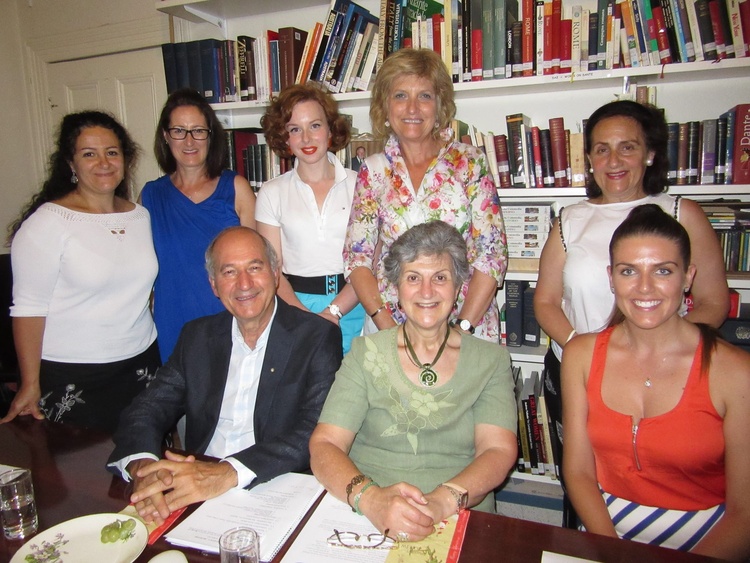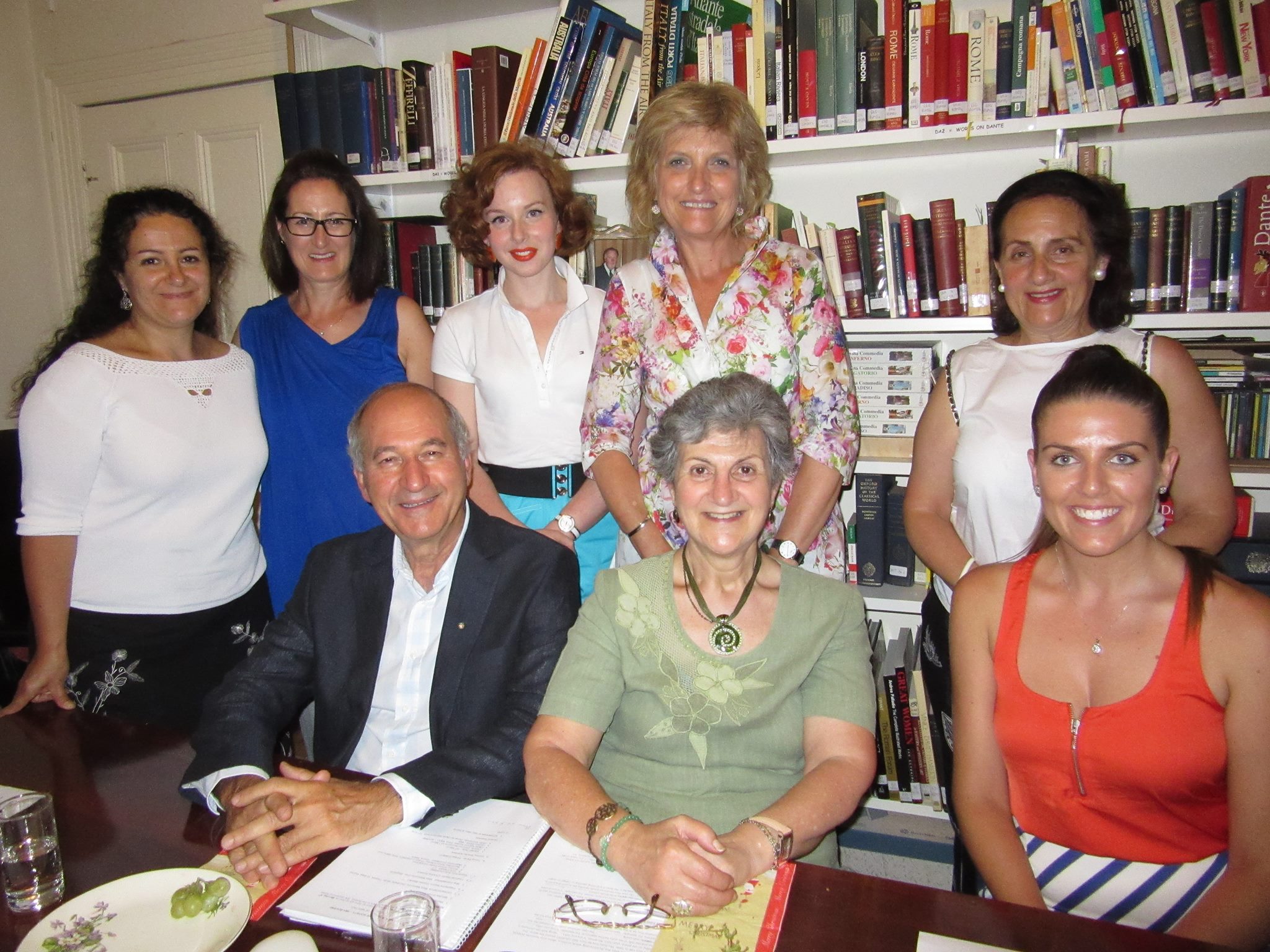This Saturday, 120 years after its foundation, the Dante Alighieri Society Melbourne will celebrate over a decade of memories and milestones.
Members and friends of Dante Melbourne will gather for a celebratory dinner at the Veneto Club in Bulleen, reminiscing on the evolution of the society over the years.
As one of the 423 branches of the Dante Alighieri Society scattered across 60 countries, Dante Melbourne is comprised of volunteers who dedicate their time to ensuring that the Italian language and culture is shared and appreciated in all corners of the globe.
Vice President of Dante Melbourne, Mary Marcuccio emphasised that since its inception, the society has always aimed to ensure the celebration of Italian language and culture, not only among Italo-Australians, but also among the wider community of Melbourne.
“We’ve tried to keep this objective all the way through these 120 years and I think we have gained the respect of the community in Victoria because we have had some very strong leaders with a sound vision and a commitment to uphold the true intent of the society which comes down to us from Rome,” Mary explained.
Becoming Vice President of the society in 2008, Mary is a walking example of what Dante Melbourne represents.
Born in Melbourne and growing up in an Italian-speaking household, Mary’s passion for Italian culture and language was engrained in her from a very young age.
“When I went to Italy for the first time this great desire developed within me to learn more about Italy and to use the language even more, so when I returned I started to go to the society’s annual general meetings, and in 2001 I joined the committee and I’ve been there ever since,” the former teacher laughed.
Made up of around 150 families of “faithful followers” from across Victoria who have remained involved over the generations, and financially supported by 90 schools, the society has provided a cultural hub for Italo-Australians and Italophiles for over a century through various initiatives and activities.
The society runs contests for schools which aim to recognise students of all abilities, from multimedia competitions for those more interested in technology, through to the more traditional literary competitions which continue to achieve record numbers of participation each year.
“This year we had 3000 students participate in the recitation competition and we have other secondary students who participate in our writing competition of poetry and prose, along with the poster competition for our primary school students,” Marcuccio said.
In addition to running activities for students, the society also seeks to encourage Italian teachers to further their knowledge of the language and culture, and in April this year Dante Melbourne gave two teachers the opportunity to complete courses at the Dante schools in Rome and Bologna, which proved to be a great success.
“These teachers have come back even more enthusiastic and passionate about everything Italian, and they’re now trying to implement what they’ve learnt out of the cultural aspect and bring that back into the classroom to enthuse their students even more,” Mary said.
The society’s influence expands beyond the classroom, and many cultural events are run for members of the community whose school days are behind them, from conversation classes to poetry appreciation sessions, Italian art lectures, and Italian language classes for adult students.
As with most organisations, the society’s future lies in the hands of its younger members, and fortunately the youth branch of Dante Melbourne is looking more vibrant than ever in recent years.
A youth group called Young Dante was established in 1983 under the presidency of a young lawyer, however after a period of prosperity, it lost its traction.
In what appeared to be a vicious cycle, the youth branch of the society would rise and fall over the decades, as young people grew up, entered the workforce and acquired other responsibilities and priorities.
Then in 2012, something changed.
“We had a vivacious and passionate young lady [named Teresa Colaianni], who came forward after we awarded her a prize for her academic achievements in Italian at university, and after a meeting we established what we now call the Dante Giovani,” Mary explained.
Ever since its rejuvenation in 2012, Dante Giovani has continued to develop, as a growing band of passionate students strive to work towards the same aim as Dante Melbourne as an entity.
Along with monthly meetings and social gatherings, Dante Giovani runs specific workshops focused on particular themes.
University of Melbourne student, Nicholas Sgro-Traikovski has recently started a course dedicated to discussing Dante’s Purgatorio, with a particular focus on the female characters within the poem.
“We’re happy to see that more and more young people are becoming members because we look to the future with our younger members,” Mary explained.
Dante Melbourne’s long-standing history hasn’t been without its challenges, and there were times when the society could have quite easily collapsed altogether, especially during its early years.
“During the war the society had to stop its activities of course, because of the alliance and the fact that Italians were known as fascists around the world, and that became a major difficulty,” Mary explains.
“They had to cease their meetings and a lot of the men were either arrested or interned because they might have had fascist connections.”
Thankfully the rising popularity of Italian culture in Melbourne kept the society on its feet against all odds.
With the wave of Italian migrants to Melbourne after the establishment of the society, came not only working class individuals and families, but also musicians, vocalists and other kinds of artists which sparked a vivacious environment around the Italian community.
Dante Melbourne organised myriad activities and events involving these new migrants and revered Italian visitors, and in turn the society itself was promoted.
But Dante Melbourne’s everlasting success is primarily due to the group of dedicated individuals behind the society who each contribute in their own way.
“All through the society’s existence it has survived with the commitment of volunteers who have worked hard and held a strong belief that Italian is a language and a culture that should make a visible impact within the community,” Mary said.
As the Italian community continues to grow in Melbourne, the society welcomes new arrivals from the Belpaese and shares a mutual appreciation for the language and culture that they bring with them to our shores.
“We are aware of the new and recent wave of young Italian singles or families that are immigrating to Australia, particularly in Melbourne,” Mary said.
“There are a lot of professionals, academics and craftspeople among them and we at Dante are interested in meeting them through our activities, but also in integrating them into our community by exploring the possibilities of giving presentations, lectures and lessons in Italian conversation.”
While Dante Melbourne will reflect on its 120-year history this Saturday, it’s clear that the society has its sights set on the future, working with young members of the community and new Italians settling in Melbourne to secure another century or so of success.












